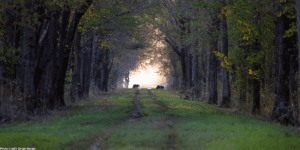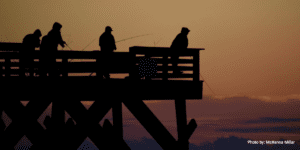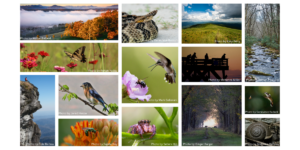In Celebration of Conservation: 2022 Year in Review

There are many things that bind people together: common interest, shared duty or experience, or belonging to a community. North Carolina Wildlife Federation is proud to be a part of a conservation community that embraces all of these values, with the mission to protect wildlife and habitat right at the center of it all.
As we continue to move into a new year and towards Valentine’s Day, we want to take the opportunity to share our love for this conservation community through a 2022 year in review. Whether you are a volunteer, a donor, an NCWF Wildlife Chapter, or a supporter, thank you for your investment of time and resources to protect wildlife and habitat in North Carolina. Without this community of support, protecting wildlife and habitat in North Carolina would be impossible. It truly takes a village, and we are grateful to be a part of yours.
Let’s take a glimpse back at some highlights from this past year!
Restoring Habitat
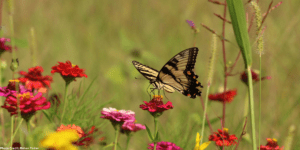
A photo of an Eastern tiger swallowtail butterfly over a field of wildflowers by Rohan Yadav, an NCWF photo contest winner.
Highlights – Restoring Habitat
NCWF volunteers and staff really hit the ground running last year and got their hands dirty restoring habitat for wildlife. In total, 2,276 volunteers participated in 136 habitat restoration projects that removed 94,062 pounds of litter, and planted 9,986 trees and plants (including 5,015 pollinator plants).
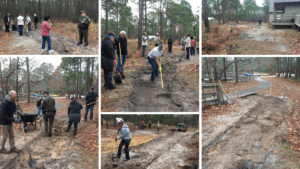
In January, staff and volunteers from NCWF, our Island Wildlife Chapter and Friends of Pleasure Island State Park broke ground on a carnivorous bog garden to restore flytrap habitat and help reduce plant poaching at Carolina Beach State Park.
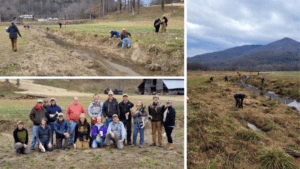
In February, NCWF and Mainspring Conservation Trust planted 1,400 livestakes (native trees and shrubs) in Bryson City on Darnell Farms. The plant installation helped stabilize a conservation easement shoreline and promote a healthy habitat for terrestrial and aquatic wildlife species.
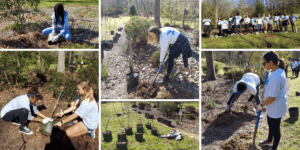
In March, Concord Wildlife Alliance volunteers led a tree planting where 30 trees were planted at McGee Park, a frequented public park along the Carolina Thread Trail. 15 Boys and Girls Club kids joined the volunteers and learned the ins and outs of native tree planting. Trees planted included redbuds, serviceberries, maples, pines and oaks.
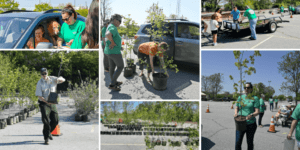
NCWF, NC State Extension, NC Urban Forest Council and NC Forest Service have teamed up for Bradford Pear Bounty NC, a program encouraging North Carolinians to remove invasive Bradford pear trees from their communities and replace them with native alternatives.
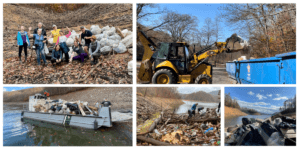
In November, volunteers removed more than 45,000 pounds of litter for the collaborative Fontana Dam Cleanup. Since 2019, volunteers have removed more than 200,000 pounds of trash from Fontana Lake.
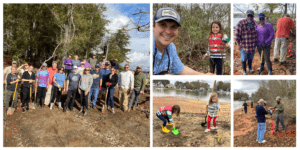
In November, Lake Norman Wildlife Conservationists planted 300 buttonbushes on two Lake Norman islands. The plants will continue to add shelter and food for wildlife and mitigate erosion.
Conserving Wildlife
Highlights – Conserving Wildlife
When it comes down to it, all of our efforts – whether it be cleanups or plantings, educational webinars, outings in nature, or policy action – are ultimately for wildlife. And in 2022, we saw tangible results for benefiting wildlife throughout the state.
It was a great year for red wolves! Six red wolf pups were born in the wild and two red wolf brothers were brought to the Red Wolf Center.
Though NCWF’s 2022 deer donation program numbers are not yet in, the program was yet again a success with hunters across the state choosing to donate their harvested venison to those in need in their communities.
By the end of the year, 880 registered habitats as pollinator pitstops along the Butterfly Highway and 825 yards became Certified Wildlife Habitats.

North Carolina will soon boast more offshore wind energy than any other state along the East Coast – and NCWF is there to ensure minimal impact to North Carolina’s marine wildlife and habitat.
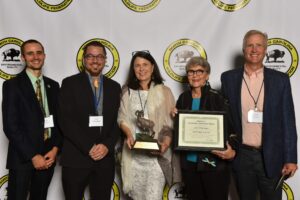
In September, NCWF honored 19 conservation heroes at the 58th Annual Governor’s Conservation Achievement Awards banquet.
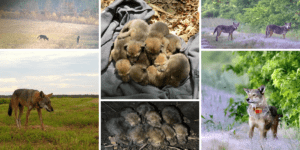
A red wolf couple – dubbed 2225F and 2323M – renewed and sparked hope for the critically endangered red wolf species when they recently became parents to six pups – the first litter born in the wild since 2018.
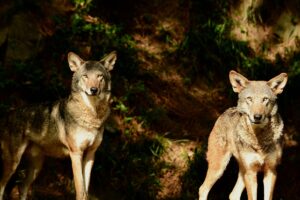
There are two new residents at the Red Wolf Center on Pocosin Lakes National Wildlife Refuge in Columbia, NC: 4-year-old red wolf brothers. Photo by Robert Wilcox, Durham Life and Science Museum
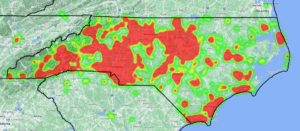
In 2022, the Butterfly Highway program provided habitat and food sources to monarchs and other pollinators through the help of participants and volunteers. This Butterfly Highway heat map demonstrates the dedication of gardeners and pollinator lovers across North Carolina. Areas shaded in red represent the highest concentrations of registered pollinator pitstops.
Connecting People to Nature
Highlights – Connecting People to Nature
A community of conservation is at its best when built around a culture of care and participation. That’s why we think connecting people to nature is so important. And this was a big year for connection to nature and wildlife. NCWF and our Community Wildlife Chapters hosted 48 outdoor events and 114 educational programs and outreach, including 57 wildlife education webinars and nearly 100,000 views on our red wolf live camera. Additionally, NCWF’s Great Outdoors University took 115 day trips and hosted 19 events, with a total of 8,122 total participants connecting to nature.

In October, beginner and novice hunters spent the day at Wood Duck Farm in Gastonia learning the ins and outs of deer hunting at a Getting Started Outdoors (GSO) workshop.
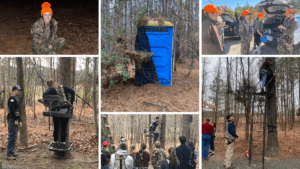
In January, College students in Raleigh who value wildlife conservation and management explored tree stand safety, ethical practices and the consumptive reasons behind deer and squirrel hunting during Academics Afield trips.
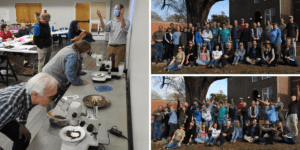
In March, 30 wildlife and nature enthusiasts completed four days of training and fieldwork with regional conservation experts to become Certified Habitat Stewards. NCWF hosted the National Wildlife Federation Habitat Stewards Training in Matthews, collaborating with our Charlotte Wildlife Stewards and HAWK community wildlife chapters. NCWF Board Directors and Officers Dave Cable and Dr. Bob Brown also completed the training designed to build skills and help others enhance and restore habitat for wildlife.
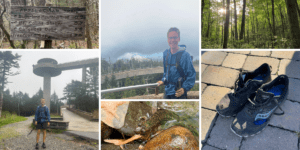
NCWF Conservation Coordinator Luke Bennett hiked 1,175 miles from the Outer Banks to the Great Smoky Mountains to immerse himself fully in North Carolina’s abundant natural resources. His 52-day trek ended with a well-worn pair of Saucony running shoes, renewed love and appreciation for our state’s diverse wildlife and habitat, and $8,315 raised toward their protection, conservation and restoration.
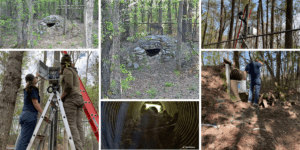
Live webcams were installed at the Red Wolf Center in Columbia NC, allowing wildlife and nature lovers from all over the world to get a 24/7 glimpse into the life of captive red wolves.
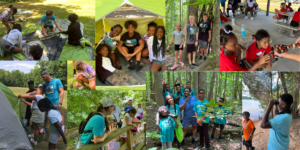
Great Outdoors University (GoU) covered the whole outdoor experience gamut! From scavenger hunts and close encounters with snakes to tent pitching and getting hooked on fishing, the program was all about sunshine, smiles and adventures for Great Outdoors University (GoU) campers!
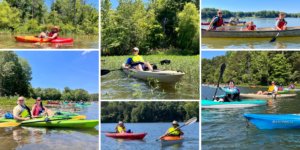
In June, Charlotte Wildlife Stewards gathered for a morning of paddling on the beautiful Mountain Island Lake for their annual fundraising event. Participants enjoyed a leisurely, guided paddle while learning about the different animal and plant life along this important Catawba River section. Sponsors donated nearly $3K worth of prizes for the 58 paddlers.
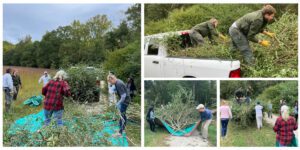
In September, NCWF joined with Wake County Parks & Recreation and brave volunteers to battle against the invasive privet plaguing the preserve. The intrepid crew successfully prepared the area for a native replanting in October.
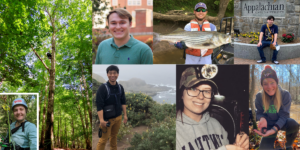
Seven undergraduate, graduate and Ph.D. students attending NC State University, Duke University, Eastern Carolina University and Appalachian State University received 2022 scholarships to support their goal of studying and working in conservation.
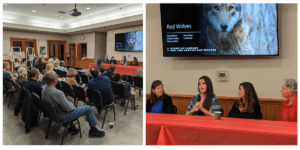
In December, The South Wake Conservationists hosted a live screening of two documentaries focused on promoting red wolf recovery and outreach. The films were followed by an interactive panel discussion about red wolves, the challenges they face to survive as a species, and efforts underway to protect them.

